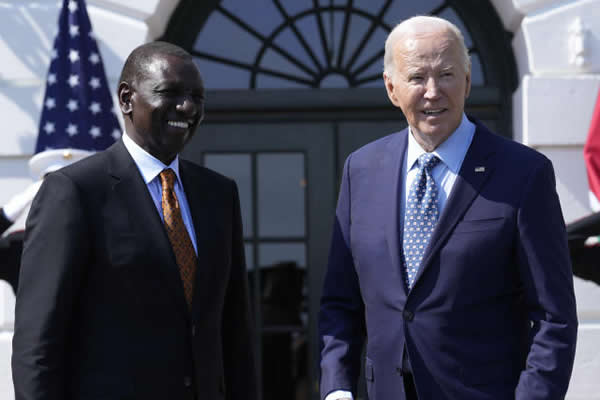
The United States will designate Kenya as its first major non-NATO ally in sub-Saharan Africa, the White House said as President Joe Biden on Thursday welcomed President William Ruto for a state visit. The significant strategic move signals the shifting of U.S. security cooperation to East Africa just as U.S. troops prepare to depart Niger, leaving a vacuum that Russian forces have begun to fill.
The designation gives non-members of the North Atlantic Treaty Organization access to military and financial advantages that NATO members enjoy, but without the mutual defense agreement that holds NATO together. A senior administration official told reporters late Wednesday that Biden would inform Congress of the designation, which takes 30 days to take effect.
The official said the move aims at “elevating and really acknowledging that Kenya is already a global partner of ours.”
In the meantime, Ruto and Biden are using their daylong deliberations to iron out Kenya’s plan to send 1,000 security officers to the fragile, chaotic Caribbean nation of Haiti. The initiative, toward which the United States has pledged $300 million in support, faces stiff political and legal challenges in Kenya. The mission was also delayed when Haitian armed gangs took control while the nation’s leader, Ariel Henry, was visiting Kenya in March. Henry resigned in April and has not returned to the island.
The official said that Ruto would meet with Secretary of Defense Lloyd Austin and Secretary of State Antony Blinken to discuss the mission but promised no progress.
“This is definitely an ongoing area of collaboration,” the official said.
And the White House on Thursday also rolled out a number of security-related agreements, which include training opportunities and military exercises, assistance in managing refugees, U.S. investments in Kenya’s security sector, counterterrorism efforts including increased information sharing and, on top of all this, 16 helicopters and 150 armored vehicles.
From bombs to bonbons
Washington also made millions of dollars of commitments toward a number of efforts the U.S. sees as key to development. Those include areas like democracy, health, education, arts and culture, climate management, trade, technology, and the one item Ruto said was his main priority on his four-day swing through the United States: work to restructure African nations’ crippling debt to the world’s largest creditor, China.
But the lengthy list of American pledges was absent the roads, bridges and railroad projects that African leaders have long said they need to keep up with their exploding populations. For those, they turn to China’s sprawling Belt and Road Initiative, which counts the African continent as the largest beneficiary of its massive, $1 trillion global project.
This, analysts say, represents Africa’s new stance as its young democracies mature, less than a century after liberation from colonialism: In a world of competition among the world’s great powers, they want to be somewhere in the middle.
“I think many U.S. officials see this very much as a zero-sum game in this kind of great power competition to gain influence,” said Cameron Hudson, a senior fellow in the Africa Program at the Center for Strategic and International Studies. “African countries don’t see it that way. They actually see the benefit of being able to partner with China on trade, with Russia on security and with Washington on development, and they don’t see any inconsistency in that approach.”
“And I think unless and until Washington becomes much more comfortable with seeing their privileged relationships become partnerized with other countries, I think it’s going to be very difficult for Washington to really chart a course forward with many of these countries,” he added.
This is the first White House state visit by an African leader in nearly 16 years, and that significance was not lost on first lady Jill Biden, who, ahead of her sixth state dinner, spoke of a glass-ceilinged pavilion set under the stars, of a gospel choir and shag carpets and “the glow of candles in a space saturated with warm pinks and reds.”
White House executive chef Cristeta Comerford narrated a menu of chilled green tomato soup touched with sweet onions and drizzled with white balsamic vinegar and fine Californian olive oil, of butter-poached lobster and seasonal bounties reminiscent of American summer. She lavished words on the bed of kale and roasted corn and corn puree and roasted turnips and sweet potatoes and squash but touched just briefly on the one item that is seen as a hallmark of a fine Kenyan feast:
“Red meat,” she said.
Specifically, she said, they are marinated and smoked short ribs, perched atop that farmers’ market worth of produce.
But it was the unnamed administration official who teased the star that could outshine all the others on this glittering night: the first and only American president of Kenyan ancestry.
When asked by a journalist if former President Barack Obama – born to a Kenyan father and an American mother – would make an appearance at the lavish dinner, the official hesitated.
“I’ll go to a quote from another former president, President Trump,” the official finally replied. And then: “‘We’ll see what happens.’”
Source: voanews.com











